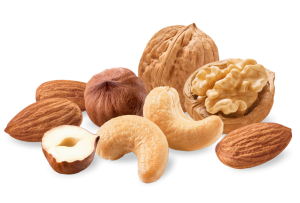Nuts are widely touted for their great taste and convenience, but their taste isn’t the only thing that makes them popular. Scientists have long touted the health benefits of making nuts a regular part of your diet.
There are many varieties of nuts. Raw mixed nuts usually contain a range of almonds, pistachios, cashews, walnuts, hazelnuts, and more. They’re readily available at almost any grocery store or gas station and pack a serious nutritional punch.
Health Benefits
Nuts are a nutritionally rich food, containing most of the vitamins and minerals the body needs. They’re one of the main sources of ALA omega-3 fatty acids, offering a range of health benefits from reducing rheumatoid arthritis to protecting against Alzheimer’s and dementia.
Experts have cited many other reasons to add nuts to your diet, including:
Weight Loss
Nuts are largely composed of fats, which might seem counterintuitive for weight loss. However, the fats in nuts are almost entirely unsaturated, which means they leave you feeling more satisfied after eating, helping you eat less over time. Studies have even found that people who eat nuts frequently are at a lower risk of gaining weight than those who seldom eat nuts.
Diabetes Control
Scientists from the Harvard T.H. Chan School of Public Health have found impressive reasons for recommending regular nut consumption as a way to manage diabetes. In a controlled study, people with type 2 diabetes who ate more than five servings of nuts per week lowered their risk of heart disease by as much as 17%.
Prevent Heart Disease
There have been many studies showing the beneficial effects of nuts on heart health. Eating nuts at least four times per week is correlated with fewer cases of coronary heart disease and myocardial infarctions.
Improve Cholesterol
Nuts also play an important role in regulating cholesterol. Scientists have found a direct correlation between eating nuts at least a few times per week and the reduction of LDL cholesterol and triglyceride levels in the body. Improved cholesterol is associated with less risk of stroke or cardiovascular disease.
Nutrition
Nuts are a good source of Vitamin E, a group of eight antioxidant compounds that help prevent cancer and avoid osteoporosis.
Nuts are also great sources of:
- Folic Acids
- Magnesium
- Potassium
- Calcium
- Phosphorous
Nutrients Per Serving
A 1/4 cup of raw mixed nuts contains:
- Calories: 165
- Protein: 4 grams
- Fat: 16 grams
- Carbohydrates: 4 grams
- Fiber: 3 grams
- Sugar: 0 grams
Portion Sizes
Not all mixes of nuts are equally healthy. For example, some are covered with large amounts of sodium or dusted with flavorings that may reduce their nutritional value. Raw nuts are usually the best bet in terms of sheer health.
How to Eat Nuts
Nuts are a commonly available item and can be easily found in almost every grocery and convenience store. For the healthiest option, be sure to choose raw nuts without added sodium.
They make for an excellent snack at any time of day, especially in the middle of the afternoon when most people’s energy levels tend to run low.
If you’re thinking about incorporating more nuts into your diet, there are many ways to do that:
- Chopped walnuts make an excellent addition to a yogurt parfait.
- Grind your own almonds into almond butter, a popular alternative to peanut butter.
- Make your own banana nut bread.
- Sprinkle pecans over a salad.
- Use cashew nuts when you’re making vegetable stir fry.
- Add almonds to a protein shake with a banana and some milk.
- Try chopped almonds with feta cheese and olives in a Mediterranean-style salad.
- Grind walnuts with herbs into a paste to garnish grilled chicken.
References :
- https://www.webmd.com/diet/health-benefits-nuts


